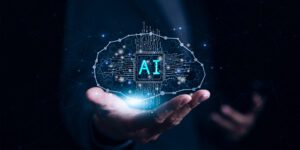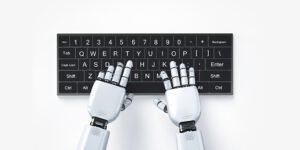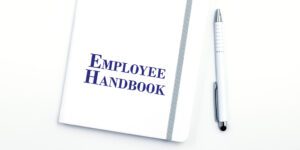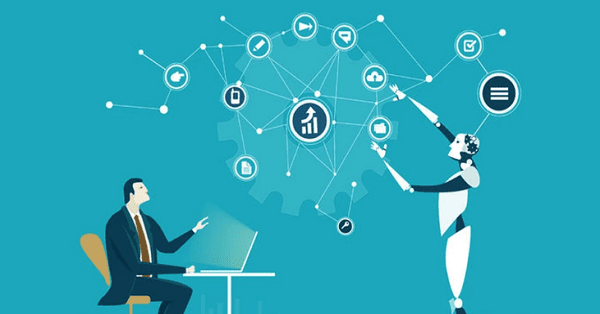Share
AI has come a long way in recent years. As of late, it has become a new software buzzword that’s even more intimidating than algorithms or KPIs. As with most cases, some of the hype is misguided, but AI is still poised to have a transformative influence on many jobs in the coming years.
How can HR utilize AI in the workplace and stay ahead of the AI revolution? Discover the growing benefits of using AI in various HR processes, as well as best practice guidelines for creating workplace AI policy.
How can AI be used in HR?
Regardless of internal policy, many workers already use AI to draft correspondence and outline reports. AI improves efficiency for certain tasks like copywriting and analysis. Your department will need to find the right tools and applications (including payroll and HR software) to make the most of AI potential.
Recruiting + workforce planning
Personalized messages and fresh ad copy attract attention. Use AI to write fresh versions of your job descriptions and drip campaigns. Older software could insert the target user’s name into the email opener or subject line, but AI has the power to personalize whole messages.
With workforce planning, you can respond to skill gaps in your current team. Find out what talent you’re lacking, allowing AI to compare your expected business growth with industry trends.
Onboarding and offboarding
The onboarding and offboarding process can feel overwhelming. There are so many steps, forms, and decisions. Existing software can verify completion and make forms remotely accessible, but AI provides flexible guidance and answers to unique questions. When workers have urgent questions after office hours, an AI chat can provide more help than a FAQs page.
Performance management
It’s hard to find inclusive metrics for performance management. The simplest productivity numbers paint an incomplete picture, but extra contextual data is harder for humans to process. AI gives helpful analysis by comparing the strengths and improvements of each worker. You can also use AI to process data about the complexity and accuracy of completed tasks.
Employee training & development
A Learning Management System is great for training employees, but the better systems come with lots of extra training material. AI can analyze the training gaps and career goals of individual workers.
Training programs should reflect each individual’s interests and aptitudes. With a personalized approach, AI can recommend a helpful series of webinars, resources, and other material.
Employee engagement
Once you’ve collected responses to employee engagement surveys, AI provides an impartial analysis of the results. HR staff will have a hard time quantifying written responses and comments, but AI can collect and compare trends in open-ended answers. Even when you read the individual responses yourself, it’s hard to see the big picture, much less compare results from multiple years.
The Future of HR: New Roles Emerge to Boost Engagement and Retention
HR support
Nobody likes the “press 1 for…” options when calling someone, but those systems tend to improve efficiency. Chatbots and virtual assistants are far less frustrating, able to understand a wide range of inputs. Chatbots can be freely available 24/7 with quick answers from the employee handbook and other resources.
Benefits of using AI in HR
Repetitive, unrewarding tasks are the ones that lend themselves to automation with AI. Computers, email, and copying machines got rid of a lot of jobs, but changing technology has opened up more rewarding careers.
HR departments that adopt AI can expect several benefits:
- Improved efficiency
AI can handle drafting emails, analyzing data, and answering routine employee questions. HR staff is still needed to direct and manage AI, but fewer work hours should be devoted to the most tedious tasks.
- Reduced costs
Recruiting, onboarding, and other HR functions can get expensive, but AI can analyze trends to find the most cost-effective channels. Use AI to motivate and reward high performers, reducing turnover.
- Better decision-making
Sort through the fog of extra data to isolate Key Performance Indicators (KPIs). Look at trends within your company alongside the broader industry. Prioritize different metrics for different outcomes.
Best practices for HR when using AI
The broad variety of AI tools and applications shouldn’t be used too haphazardly. It remains to be seen how federal agencies will regulate the future development of AI, but your HR department can proceed now with appropriate caution.
Set and track goals
Define your goals and metrics before introducing new AI tools like chatbots. Are you hoping to reduce the volume of employee queries directly to HR staff? Will your deployment focus on reducing turnover or missed deadlines? Clarify your goal and set a timeline for when to assess results.
Be aware of the risks & limitations
Some of the limitations and pitfalls of AI have been widely publicized. Depending on the data you provide, AI can bring unexpected biases into your hiring and recruiting process. Even if you’re promoting DEI year-round, your AI might still favor applicants who resemble your current workforce.
Ensure data quality
Flawed data can ruin the final results of AI analysis. “Garbage in, garbage out” (GIGO) is a common saying in tech, where even tiny mistakes can skew results. To maintain the integrity of your input data, HR staff needs to regularly perform data audits, cleansing, and validation.
Training
HR staff will need training in the application and limitations of AI. Your team will need to be vigilant in avoiding problems like bias, which could expose the company to liability. Watch out for changes to state and federal law. Update your employee handbook and explain to staff that AI does not replace human reasoning and decision-making.
Privacy and security concerns
Be careful about giving AI access to sensitive personal data of employees. Social security and bank account numbers won’t have much value for analysis, but inclusion in an AI database could become a security breach. Similarly, if you want to encourage employees to give anonymous feedback, then AI systems may be unnecessarily complex.
Discover how Netchex can help your business grow more efficient by using AI in HR:
Related articles

What is HR AI and How It Can Help Achieve Your Strategic Goals

The Future of Work is Here: Netchex Unveils Industry-First AI Solution for HR

Future-Proofing Your Career: Job Skills for Success in the AI Era

